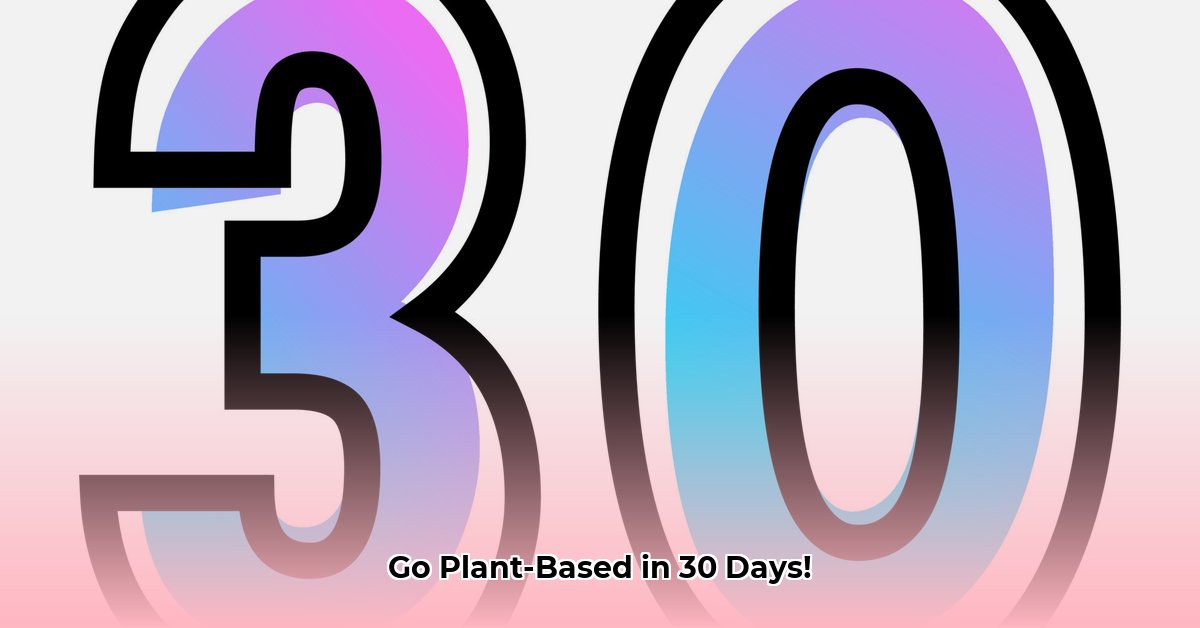Want to feel amazing and eat delicious food? This 30-day plant-based meal plan is your roadmap to a healthier you. We’ll show you three different plans, so you can pick the one that best suits your lifestyle. We’ll break down what makes each plan unique, offer super simple recipes, and give you the inside scoop on making this journey a breeze. Plus, we’ll share tips and tricks from real people who’ve already done it, so you’ll feel supported every step of the way. Let’s make this plant-based adventure fun and easy! To help with your shopping, check out this helpful plant-based grocery list.
30-Day Plant-Based Diet Meal Plan: Your Simple Guide to a Healthier You
Ready to dive into a plant-based lifestyle? A 30-day plant-based meal plan can be a fantastic way to explore all the delicious and nutritious options available. This guide isn’t about strict rules, but about finding a plan that fits your life and helps you feel your best. We’ll compare a few approaches, then walk you through a super simple plan, perfect for beginners.
Understanding Plant-Based Eating
A plant-based diet focuses on foods derived from plants. This includes fruits, vegetables, legumes, nuts, seeds, and whole grains. While some plant-based eaters are vegan and avoid all animal products, others may include small amounts of meat, dairy, or eggs. The core principle is to prioritize plant-based foods in your diet.
What are the Benefits?
Embracing a plant-based diet can have numerous health benefits. Many studies suggest that plant-based diets are associated with a lower risk of heart disease, type 2 diabetes, certain cancers, and obesity. Plant-based diets are typically rich in fiber, vitamins, minerals, and antioxidants.
Finding the Right Plant-Based Plan for You
There’s a whole world of 30-day plant-based meal plans out there – some are incredibly detailed, others give you a lot more freedom. The best one for you really depends on how much experience you have with cooking and plant-based eating.
Let’s look at three common types:
| Plan Type | Pros | Cons | Best For |
|---|---|---|---|
| Highly Structured | Clear daily guidance; easy to follow for new plant-based eaters; less thinking required | Less flexibility; might feel restrictive; can be monotonous. | Absolute beginners; those who prefer straightforward instructions |
| Moderately Flexible | Allows for some ingredient swaps; encourages creativity and experimentation; helps build confidence | Requires more planning and meal prep; demands some culinary skills | People with some cooking experience; those who value variety |
| Very Flexible | Maximum freedom to choose what you eat; promotes long-term habit building | Needs significant planning; requires good understanding of plant-based nutrition; might lead to nutritional imbalances if not carefully planned | Experienced plant-based eaters; people with a good grasp of nutrition |
This table gives you a general idea. The “best” plan is the one you’ll actually stick with! Don’t feel pressured to choose the most complex option if you’re just starting out.
Your Simple 30-Day Plant-Based Meal Plan: A Beginner’s Journey
This plan prioritizes ease and simplicity. It’s designed to ease you into a plant-based diet without overwhelming you with complicated recipes. We’ll focus on wholesome, unprocessed foods that are both delicious and good for you.
Week 1: Getting Comfortable
- Days 1-7: Start with familiar foods you already enjoy. Think hearty oatmeal with fruit for breakfast, large salads with plenty of veggies and maybe some beans or chickpeas for lunch, and simple lentil soup or vegetable stew for dinner. The goal is to ease into the change and avoid feeling deprived.
Week 2: Expanding Your Horizons
- Days 8-14: Let’s introduce some new plant-based protein sources! Try tofu scrambles with your favorite veggies, black bean burgers on whole-wheat buns, or quinoa bowls bursting with colorful vegetables and a flavorful dressing. Don’t be afraid to experiment with different spices and herbs to add excitement to your meals.
Week 3: Getting Creative in the Kitchen
- Days 15-21: Now it’s time to get creative! Explore diverse cuisines and cooking techniques. Try veggie stir-fries with a variety of vegetables and a delicious sauce, pasta with a vibrant marinara sauce loaded with veggies, or a fragrant and flavorful vegetable curry. The more you experiment, the more fun you’ll have!
Week 4: Maintaining Your Momentum
- Days 22-30: You’ve made it this far – fantastic work! By now, you’ve probably found some favorite meals and established a comfortable plant-based routine. Continue experimenting and finding new meals that you genuinely enjoy. The key to long-term success is to create a sustainable and satisfying eating plan.
Sample Recipes (Feel free to adapt!):
- Breakfast: Overnight oats with berries and nuts, tofu scramble with spinach and mushrooms, smoothies packed with fruits, vegetables, and plant-based protein powder, whole-grain toast with avocado and everything bagel seasoning.
- Lunch: Big salads with a variety of beans, lentils, or quinoa, veggie wraps with hummus and your favorite fillings, hearty vegetable soups, leftover dinners from the night before.
- Dinner: Lentil soup, vegetable curry, black bean burgers, pasta with marinara sauce and vegetables, roasted vegetables with quinoa or brown rice, sweet potato and chickpea bowls with tahini dressing.
Tips for a Successful Plant-Based Journey
-
Plan Ahead: Prep some ingredients or entire meals in advance. This makes sticking to your plan much easier, especially on busy days. Chop vegetables, cook grains, or make a batch of soup on the weekend to save time during the week.
-
Hydrate: Drink plenty of water throughout the day. This is crucial for overall health and can also help to curb hunger pangs. Carry a water bottle with you and sip throughout the day.
-
Listen to Your Body: Pay attention to your hunger and fullness cues. Adjust portion sizes as needed, don’t force yourself to eat more than you need. It can take some time for your body to adjust to the higher fiber content of a plant-based diet, so start slowly and gradually increase your fiber intake.
-
Embrace Experimentation: Don’t be afraid to try new recipes and ingredients. Part of the fun is discovering new favorites! Look for plant-based cookbooks, blogs, or online resources for inspiration. Explore cuisines from around the world that feature plant-based dishes.
-
Build a Support System: Share your journey with friends, family, or online communities for encouragement and support. Having a support system can make a significant difference in your success.
-
Address Potential Challenges Proactively: You might experience some initial challenges like cravings or social situations that make eating plant-based difficult. Plan for these in advance by identifying potential obstacles and having strategies ready to cope. It is important to be prepared for setbacks and to view them as opportunities to learn. Consider keeping healthy plant-based snacks on hand to avoid unhealthy cravings.
Remember, consistency is more important than perfection. Your 30-day plant-based journey is about finding a balanced and enjoyable way of eating that nourishes your body and satisfies your taste buds. It’s a journey of discovery, not a race! Did you know that a well-planned plant-based diet can significantly reduce your risk of heart disease?
How to Customize a 30-Day Plant-Based Meal Plan for Specific Dietary Needs
Ready to embark on a plant-based journey? A 30-day plan can be a fantastic starting point, but tailoring it to your individual needs is key. Let’s explore how to make this adventure both delicious and successful and explore your nutritional health!
Understanding Your Needs: The Foundation of Customization
Before diving into recipes, honestly assess your dietary needs and preferences. Are you strictly vegan, or is a plant-focused approach sufficient? Do you have allergies, intolerances, or specific health conditions? Knowing this empowers you to choose the right plan and make informed adjustments. Consider what feels manageable – a gradual transition or an immediate, complete switch? Consider consulting with a registered dietitian or nutritionist to assess your individual needs and develop a personalized plan.
Choosing Your 30-Day Plan: A Comparison
Several 30-day plant-based meal plans exist, each with its pros and cons. Let’s compare three popular approaches:
| Plan Type | Flexibility | Recipe Complexity | Vegan? | Focus |
|---|---|---|---|---|
| Beginner-Friendly Plan | Very High | Low | No | Gradual introduction of plant-based foods |
| Balanced Vegan Plan | Moderate | Moderate | Yes | Nutrient balance and variety |
| Advanced Vegan Plan | Low | High | Yes | Specific health goals (e.g., weight loss) |
Note: These are generalizations; specific plans will vary. For example, some “beginner” plans might be quite restrictive, while some “advanced” recipes may be surprisingly simple. The key is choosing a plan that resonates with your current level of culinary expertise
- Why Am I Always Thinking About Food? Your Body and Brain Explain - February 2, 2026
- Healthy Eating Is About Quality, Not Just Calories - February 1, 2026
- Healthy Living Products to Elevate Your Wellness Routine - January 31, 2026










